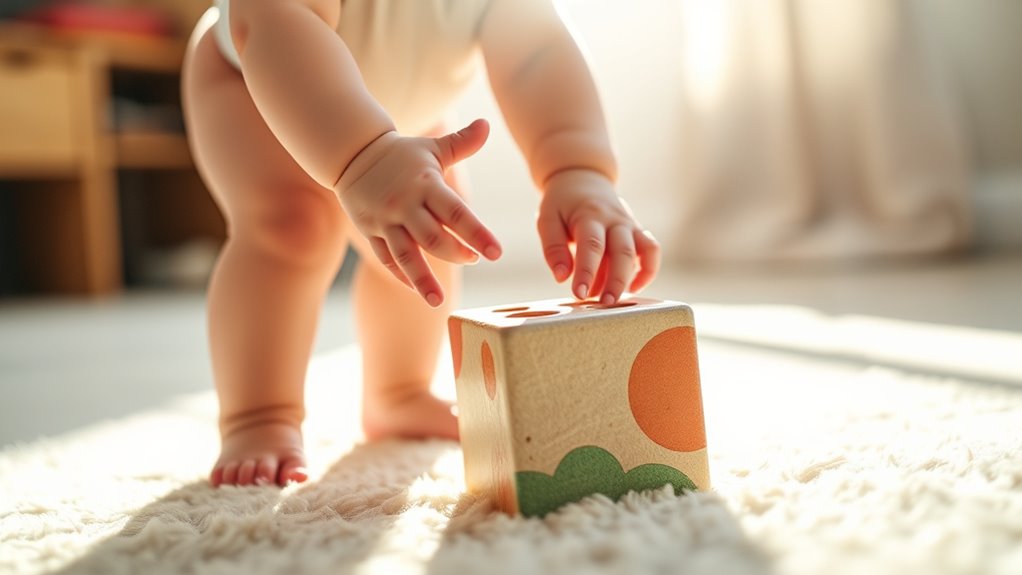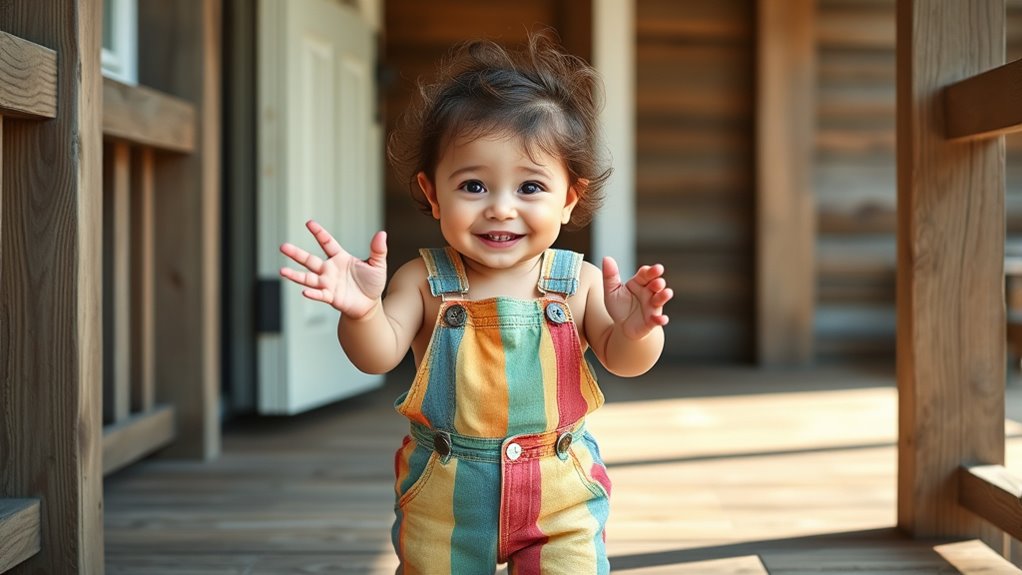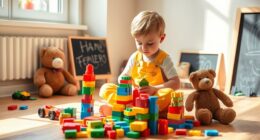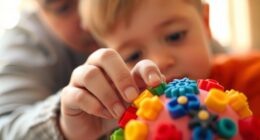At 10–12 months, your baby makes great progress with motor skills by pulling up, crawling confidently, and maybe taking first steps. They expand their vocabulary, babbling and understanding simple words or instructions. Their curiosity and problem-solving grow as they explore objects and their environment. Socially, they respond to their name, enjoy peek-a-boo, and show preferences for certain people. If you keep exploring, you’ll discover even more ways to support their development during this exciting stage.
Key Takeaways
- Babies typically start to stand and take their first steps between 10-12 months.
- Fine motor skills improve with increased precision in grasping and exploring objects.
- Vocabulary expands with babbling, imitating sounds, and early words like “mama” or “dada.”
- Social skills develop through engagement in games, eye contact, and responding to social cues.
- Cognitive exploration increases as infants experiment with objects and solve simple problems independently.
Physical and Motor Skills Development

Have you ever wondered how your baby begins to master their physical abilities between 10 and 12 months? During this stage, sensory integration plays a crucial role, helping your little one coordinate sights, sounds, and touch to refine their movements. They start to develop impressive fine motor skills, like picking up small objects with thumb and forefinger, and manipulating toys with increasing precision. You’ll notice your baby reaching, grasping, and exploring their environment with more control. These skills are essential for future tasks such as feeding themselves or turning pages. As their muscles strengthen, they also become more stable when sitting or crawling. Supporting their exploration encourages both sensory integration and fine motor development, setting a solid foundation for their growing independence.
Communication and Social Growth

Wondering how your baby’s communication and social skills develop between 10 and 12 months? During this time, you’ll notice significant vocabulary expansion as your little one babbles, imitates sounds, and possibly says a few words like “mama” or “dada.” Their understanding of language deepens, and they begin to recognize names and simple instructions. Social interactions become more engaging; your baby seeks eye contact, responds to their name, and enjoys playing simple social games like peek-a-boo. They become more aware of others’ feelings and may show preferences for certain people. These milestones highlight their growing ability to connect, communicate, and build relationships. Supporting these developments with responsive responses encourages your baby’s confidence and social curiosity. Using tools like eye patches can also help improve the appearance of the eye area, boosting your little one’s confidence as they explore their social environment. Additionally, engaging in regular social play can further enhance their social skills and emotional understanding. Recognizing their progress in language comprehension can motivate you to continue fostering their communication growth through reading and talking.
Cognitive and Exploratory Behaviors

As your baby’s social interactions become more engaging, their curiosity about the world around them grows stronger. They start to explore through sensory exploration, touching and tasting new objects to understand their environment. You’ll notice them examining things closely, turning objects over, and observing how they work. This stage also boosts their problem-solving skills, as they experiment with how items fit together or how to reach something out of reach. They may try different approaches, like banging or shaking objects to see what happens. Encouraging safe exploration helps develop their cognitive abilities, fostering a sense of independence. Your encouragement and safe environment support their natural curiosity, laying the foundation for more complex thinking and learning in the months ahead.
Frequently Asked Questions
How Can I Encourage My Baby’s Early Language Development?
You can encourage your baby’s early language development by talking to them often, describing what you’re doing, and naming objects around them. Read books together daily to boost speech development and introduce new vocabulary. Sing songs and nursery rhymes to make learning fun. Respond promptly to their sounds and gestures, which helps build their vocabulary. Your active engagement fosters confidence and helps develop strong communication skills early on.
When Should I Be Concerned About Delayed Motor Skills?
Sure, worry about delayed motor skills only if your baby still can’t roll over by 6 months or sit without support by 8 months. If they miss major milestones, like crawling or standing by their first birthday, it’s time to talk to a pediatrician. Don’t dismiss developmental concerns—early intervention can make a difference. Remember, every baby develops at their own pace, but significant delays deserve expert attention.
What Are Safe Ways to Promote Social Interaction?
To promote social interaction safely, organize playdate ideas that encourage sharing and cooperation, like simple group games or storytime. You can also try social skill activities such as turn-taking or role-playing to help your child develop communication and empathy. Always supervise closely, choose familiar environments, and guarantee interactions are positive. These activities help your child build confidence and social skills in a safe, supportive setting.
How Do Sleep Patterns Influence Developmental Milestones?
Sleep patterns, like sleep cycles and nap routines, directly shape your child’s development. When they get consistent, restful sleep, their brain consolidates skills and memories, fueling growth. Disrupted sleep can delay milestones, affect mood, and hinder learning. Establishing regular nap routines and respecting their sleep cycles helps your child stay alert and motivated, fostering healthy physical and cognitive growth during these essential months.
Are There Specific Toys That Support Cognitive Growth?
You should choose toys that promote sensory play and interactive games to support your child’s cognitive growth. Items like textured blocks, musical instruments, and shape sorters stimulate their senses and encourage problem-solving. By actively engaging with these toys, your child develops essential skills like memory, coordination, and understanding of their environment. Incorporate variety and hands-on experiences to foster curiosity and accelerate their developmental milestones.
Conclusion
As your little one reaches 10–12 months, exciting changes are just around the corner. Their growing skills hint at the incredible milestones ahead, from walking confidently to sharing new expressions. Each day brings new discoveries and surprises, hinting at the toddler they’re becoming. Stay tuned—you won’t want to miss the next chapter in their journey, filled with even more wonder, growth, and unforgettable moments. The best is yet to come.









